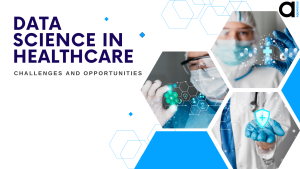Challenges and Opportunities of Data Science in Healthcare

Data science has recently become a crucial component of the healthcare sector. Big data and machine learning have created new opportunities for enhancing patient outcomes, cutting expenses, and boosting healthcare system effectiveness. However, there are issues and possibilities to consider, just like with any new device. This article will examine the difficulties and opportunities of data science in healthcare. Big data can often become challenging to manage or read. Hence you can approach a data science consulting service for efficiently handling the same.
Overview Of Data Science In Healthcare
Statistical analysis, machine learning, and data visualisation are all components of the interdisciplinary subject of data science, which uses these techniques to draw conclusions and knowledge from data. Large data sets are analysed in the healthcare sector using data science to enhance patient outcomes, lower expenses, and boost productivity. This process also entails analysing genetic information, medical images, and computerised health records to find patterns and associations that can guide clinical choices. To improve healthcare outcomes, data science also creates predictive models to pinpoint patients at risk of contracting specific conditions. By enabling the more individualised and efficient patient treatment, it has the potential to revolutionise the healthcare sector.
Importance Of Data Science In Healthcare
Due to its potential to increase patient outcomes and decrease expenses, data science has grown significantly in the healthcare industry. Here are some main arguments in favour of data science in healthcare:
Predictive modelling
Predictive models that pinpoint patients at risk of getting specific conditions can be created using data science. This can assist medical professionals in taking action sooner and halt the progression of more severe illnesses, eventually improving patient outcomes.
Personalised medicine
Data science can assist medical professionals in customising treatments for distinct patient traits like genetics and medical background. Precision medicine is a method that can result in more efficient treatments and improved patient outcomes.
Improved efficiency
Data science can help healthcare workers improve their workflows by identifying inefficiencies in processes by analysing vast amounts of data. This could lower expenses while raising the standard of care.
Medical imaging
Healthcare professionals can use data science to analyse medical images like X-rays and MRIs to find patterns and anomalies that may be hard for the human eye to spot. This may result in early and more precise diagnoses, which better the prognosis for the patient.
Challenges of Data Science in Healthcare
Data Privacy and Security
The healthcare sector places a premium on data protection and privacy. There is growing worried about the possibility of data breaches and cyberattacks as more private data are gathered, stored, and processed. To safeguard patient data, healthcare organisations must ensure they have strong data security measures.
Lack of Standardisation
Data science encounters many difficulties because healthcare data needs standardization. It can be difficult to successfully extract and analyse data due to the wide variety of data sources, formats, and systems used in healthcare. To guarantee consistency and the accuracy of data analysis, standardisation is required.
Data Quality and Availability
Practical data analysis depends on the quantity and quality of the data. However, drawing conclusions from healthcare data can be challenging because it is frequently erroneous, inconsistent, and insufficient. Data quality must be addressed to ensure that data science can be used successfully in healthcare.
Resistance to Change
A traditional approach to patient care distinguishes the highly regulated business of healthcare. People often meet change with opposition, and data science is no exception. Healthcare organisations must be eager to adopt new procedures and technologies to profit from data science.
Ethical Concerns
Privacy, consent, and prejudice are a few ethical issues that data science in healthcare brings up. To guarantee that data science is applied responsibly and honestly, it is crucial to address these concerns. Talk to your data science consulting service provider if you have one in this regard.
Data Retention
Health data needs to be accessible for a minimum of five years. Therefore, organisations must adopt a long-term strategy for data upkeep and keep track of information regarding the frequency, nature, and intent of data access. Organisations must set up procedures to regularly go through the data and delete it when necessary, modify it and make it anonymous, or use it in new ways, such as to analyse patterns over several years.
Applications and Opportunities of Data Science in Healthcare
There are many uses for data processing in the healthcare industry. The following are some crucial areas where doctors and related professionals use data analysis to enhance patient results and boost effectiveness:
Electronic health records (EHRs)
EHRs are examined using data analysis to find patterns and trends in patient data. This can assist medical professionals in making better clinical judgements and enhancing patient results.
Medical imaging
Medical imaging, such as X-rays and MRIs, are analysed using data analysis to find trends and anomalies that may be hard for the human eye to spot. This may result in early and more precise diagnoses, which better the prognosis for the patient.
Drug discovery and development
Large quantities of genomic data are analysed using data analysis to find possible drug targets and create better treatments for various conditions.
Predictive modelling
Predictive models that can pinpoint patients at risk of getting specific conditions are created using data analysis. This can assist medical professionals in taking action sooner and halt the progression of more severe illnesses, eventually improving patient outcomes.
Process optimisation
Healthcare professionals use data analysis to pinpoint inefficiencies in healthcare procedures and assist providers. This could lower expenses while raising the standard of care.
In Conclusion
Healthcare is one area where data science has excelled, from curing cancer to minor headaches. The ability of researchers and medical professionals to use historical data to comprehend previous failures and develop safer and more effective treatments for the future is also beneficial. Data science and its application in the industry are now more widely known. To contribute to a healthy future, there is still a lot of room for growth in the application of data science in the field and in user adoption of that in the health line industry.
Aquarious Technology, a global digital agency, provides expert data science consulting service in various industries, including healthcare, real estate, fitness, education and cab services. Talk to us to learn more.
-
14
+Category
-
98
+Post
Top Categories
Popular Posts
- The Power of Prototyping in Software Development
- Version Control Best Practices for App Development
- Understanding Visual Hierarchy: A Guide to Effective Design
- Crafting Intuitive Navigation: A Guide to Seamless User Experience
- Choose Your Best Cloud Provider
- Making the Leap: Transitioning from Manual to Automated Software Testing
- Using GitHub- Advantages and Disadvantages
- E-commerce Product Photography on a Budget
- Tech Innovation in Developing Countries
- Smart Cities: How Technology is Shaping the Urban Landscape
- Principles of Composition: Creating Visual Harmony with Composition
- Exploring Cross-Platform App Development
- Why Regular Website Updates Matter
- Navigating Effective Facebook Audience Targeting
- Implementing Ads for Game Monetization
- Designing User-Centric Mental Health Apps: Enhancing Well-being in the Digital Age
- NFTs and Collectibles: Creating NFT App Solutions for Collectors and Enthusiasts
- Successful Implementation of Enterprise Apps
- Maximizing Business Impact with EQ
- Proven SMO Ads Optimization Tips (2023)






